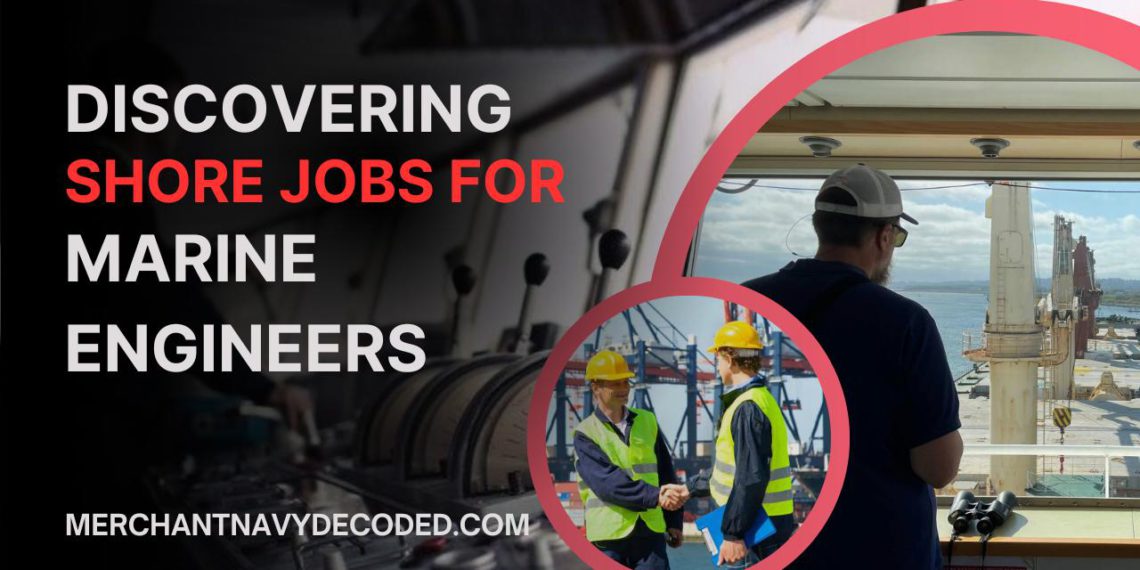Navigating Shore Job for Marine Engineers | 2023
Overview:
Dive into a world of opportunities as we unveil the incredible potential that awaits marine engineers beyond the open sea.
From transferable skills to cutting-edge technology, find out why marine engineers are the ultimate problem solvers and adaptable professionals.
Navigate through various Core, Broader and unrelated to shipping careers for Marine engineers.
What is Marine Engineering?
Marine engineering, in simpler terms, is a field of engineering that focuses on designing, building, and maintaining various types of ships, boats, and offshore structures. Marine engineers are responsible for ensuring that these vessels and structures function safely and efficiently in aquatic environments like oceans, rivers, and lakes.
They work on a wide range of tasks, such as designing the propulsion systems of ships, developing navigation and communication systems, and overseeing the mechanical and electrical systems on board. Marine engineers also play a crucial role in ensuring that ships meet environmental and safety regulations.
In essence, marine engineering is all about making sure that everything related to water transportation, from the engines to the safety features, works smoothly and reliably.
If you’re seeking more information on the process of becoming a marine engineer and the various aspects of this career, you can refer to our earlier blog posts for in-depth details and insights.
Why do Marine Engineers have an edge over other options while shifting to shore?
- Versatile Skill Set:
Marine engineers possess a unique skill set honed in the demanding maritime environment. Their problem-solving abilities, technical expertise, and strong work ethic make them adaptable and highly valued professionals in various onshore industries.
- In-Depth Industry Knowledge:
With an intimate understanding of ships, engines, and maritime systems, marine engineers bring specialized industry knowledge that can be applied to shore-based roles in fields like port management, logistics, and maritime consultancy.
- Proven Resilience:
Having spent extended periods at sea, marine engineers have developed resilience, teamwork, and leadership skills. These qualities make them dependable and effective professionals in both technical and managerial positions onshore.
These advantages position marine engineers as valuable assets in a wide range of onshore careers, making their transition from sea to land a strategic and rewarding choice.
Option for Marine Engineers in the Core Shipping Company
Having a background as a marine engineer provides a significant advantage in core shipping industry jobs due to the wide range of transferable skills that open doors to numerous career options. Some of these options are outlined below.
A short insight into jobs related to core shipping for Marine engineers:
Technical Superintendent:
Oversee vessel maintenance and operations, ensuring compliance with safety and regulatory standards.
Vessel Voyage Optimizer:
Utilise data analytics to enhance voyage efficiency, fuel consumption, and overall performance.
Purchase and Sale Departments:
These departments manage the procurement and sale of maritime equipment, vessels, or parts, facilitating the smooth flow of resources in the shipping industry.
Crewing Department:
Crewing professionals are responsible for recruiting, assigning, and managing the crew members who operate and maintain ships.
Bunker Manager:
Bunker managers handle the procurement and management of fuel resources for vessels, ensuring fuel efficiency and compliance with regulations.
Data Manager:
Specialises in managing and analyzing onboard data from vessels, using advanced tools and technology to improve performance and efficiency.
Assistant Technical Superintendent:
Assists senior technical superintendents in managing vessel maintenance and repairs, gaining valuable experience in ship operations.
Surveyor:
Conducts inspections and surveys related to hulls, machinery, or cargo to ensure safety, compliance, and quality assurance in the maritime industry.
Indeed, the careers mentioned, including hull inspector, machinery handling, and plant maintenance system, are just a few examples among a wide array of core shipping-related job options. There are numerous other roles within the maritime industry that cater to various specializations and expertise areas.
Options for marine engineers in Commercial and Broader maritime domains
The transferable skills possessed by marine engineers hold significant value, not only within the core shipping industry but also in broader sectors where machinery plays a crucial role. There are various career options that may not be directly related to core shipping and management but are still closely associated with the expertise of marine engineers, as outlined below:
Maritime Law:
Maritime law involves legal matters related to the sea, ships, and maritime commerce, addressing issues like contracts, accidents, and environmental regulations.
Port Operations:
Port operations entail the efficient management of ports, including cargo handling, customs, security, and logistics to ensure smooth maritime trade.
Surveying in Broader Maritime:
Surveyors inspect vessels, machinery, and cargo to ensure safety, compliance, and quality assurance in the maritime industry.
Technical Management of Shore Machinery:
This role involves overseeing the maintenance and operations of onshore machinery used in maritime-related processes.
Maritime Entrepreneurship:
Maritime entrepreneurship refers to starting and managing maritime-related businesses, such as marine consulting firms or ship-related services.
Shipyard in Broader Maritime Operations:
Shipyards are facilities for building, repairing, and maintaining ships and vessels, playing a key role in the broader maritime industry’s supply chain and infrastructure.
Discovering Jobs unrelated to shipping careers for Marine Engineers
While marine engineers excel in the maritime industry, their skills and expertise are transferable to various unrelated career paths. Let’s uncover exciting opportunities beyond the sea, where their technical acumen and problem-solving abilities are highly valued. Some options are as mentioned
Hospitality Industry:
In the hospitality sector, marine engineers can apply their technical skills to manage and maintain machinery in hotels, resorts, or cruise ships.
Facility Management:
Facility managers oversee technical and administrative aspects of large facilities like office complexes, ensuring smooth operations and maintenance.
Factory/Automobile Industry:
Marine engineers can work on machinery maintenance and operations in manufacturing settings, including factories or the automobile industry.
MBA/Product Manager:
Pursuing an MBA and transitioning into roles such as product manager allows marine engineers to leverage their problem-solving skills in different industries.
Core Technology/Data Scientist:
Transitioning into core technology or data scientist roles involves using analytical and technical expertise for various applications beyond the maritime sector.
Business Development Manager:
Business development roles in various industries, unrelated to shipping, welcome marine engineers for their problem-solving abilities and adaptability.
Government Jobs:
Marine engineers can explore government positions related to engineering, environmental regulations, infrastructure development, and more, offering diverse career opportunities outside of the private sector.
Conclusion
In this blog, we’ve ventured into the world of possibilities that await marine engineers when they decide to shift from sailing to onshore careers. Here, we are not stating that Marine Engineering is not a good profession, in fact, it is one of the best professions you can get yourself into, we have also made an article on how you can join B. Tech Marine Engineering. We’ve just explored the advantages, transferable skills, and diverse options available in core shipping, broader maritime, and unrelated industries.
In case you are confused about what is the right time to shift Onshore you can visit our previous blog and yeah, stay tuned for our upcoming blogs, where we’ll delve even deeper into the plethora of options available to officers as they navigate the transition to shore-based careers. From specialized roles to entrepreneurial ventures, the journey of marine engineers continues to be filled with endless opportunities for success beyond the open sea.
Disclaimer :- The opinions expressed in this article belong solely to the author and may not necessarily reflect those of Merchant Navy Decoded. We cannot guarantee the accuracy of the information provided and disclaim any responsibility for it. Data and visuals used are sourced from publicly available information and may not be authenticated by any regulatory body. Reviews and comments appearing on our blogs represent the opinions of individuals and do not necessarily reflect the views of Merchant Navy Decoded. We are not responsible for any loss or damage resulting from reliance on these reviews or comments.
Reproduction, copying, sharing, or use of the article or images in any form is strictly prohibited without prior permission from both the author and Merchant Navy Decoded.



[…] If you are a Marine Engineer searching for options onshore, we have got you covered: Types of Shore Jobs for Marine Engineer […]